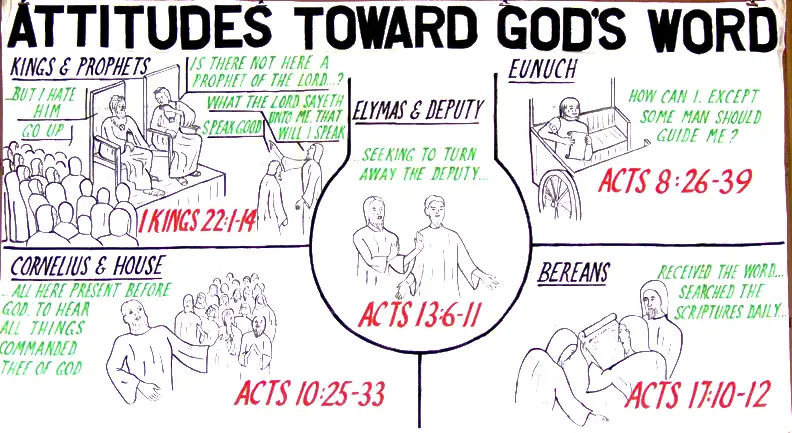Updated:- Monday, November 6th, 2023
Importance of Our Attitudes to the Word of God
The brethren in Thessalonica displayed different attitudes as they received the Word of God from those in Berea. They differentiated themselves in a memorable manner.
But what really is the Word of God? Additionally, what is the Word of God according to the Bible?
What Is the Word of God?
The first thing we should be aware of is the fact that it is not a single word. Nevertheless, when used loosely, it means the Words of God.
Therefore, it is communication that comes from God and it could take various forms. It is “of God” which means that it belongs to Him!
It could either be spoken or written.
Why Is The Bible Called The Word of God?
When the Word of God is spoken, it could be directly spoken by God, or through a person or an angel.
If God communicates His Word to someone and that person writes it that too is the Word of God. This is how the Holy Bible was born.
Secondly, although it is God’s word(s) they don’t usually come directly from Him. Most times the Word of God comes via a middleman.
Recently, I wrote, what is the best Bible for beginners? Check it out here!
What Is the Word of God According to The Bible?
We shall find the first occurrence of the Word of God, in the Bible, in the quotation immediately below.
And as they were going down to the end of the city, Samuel said to Saul, Bid the servant pass on before us, (and he passed on), but stand thou still a while, that I may shew thee the word of God.
1 Samuel 9:27
So, even though this was God’s Word, He did not speak it directly to Saul; instead, He utilized a middleman, the Prophet Samuel, to speak His Word to him.
Note, also that Samuel did not speak a single word to Saul but several words.
Here is another example. Apostle Paul preached in Antioch, in Pisidia, and the people came out in droves to hear him.
“And the next sabbath day came almost the whole city together to hear the word of God.”
Acts 13:44
These were not Paul’s words but God’s. But Paul was the instrument He used to communicate His desires to these people.
And again, note that it was not a single word but many.
Features of The Word of God
- It is pure Proverbs 30:5.
- We should live by every one of them Luke 4:4.
- We should hear it then do it Luke 8:21.
- It is alive and powerful Hebrews 4:12.
- Jesus utilized it to create the world Hebrews 11:3.
- The Word of God is “incorruptible”, alive, and everlasting 1 Peter 1:23.
- Allow it to reside in you 1 John 2:14.
- Another name for Jesus Christ, is the Word of God, Revelation 19:13; John 1:1.
What Forms Do The Emission From God Take?
It doesn’t always manifest as words. Nevertheless, sometimes communication from God takes another form. For example, it could be a vision.
This form combines words with visuals.
The Lord spoke to Simon Peter via a vision of a sheet knitted a the four corners and descending from heaven.
But, while he saw a picture of it he heard words from God. Words constitute the major manner in which God communicates with humanity.
“And the brethren immediately sent away Paul and Silas by night unto Berea: who coming thither went into the synagogue of the Jews.”
Acts 17:10

Importance of Our Attitudes to the Word of God
One of the first things Apostle Paul did when he got to Thessalonica, and now also in Berea, was to find a local assembly; mainly, a “synagogue of the Jews” (Acts 17:10).
In the former place, there was a division, some believed it but others didn’t.
But in the latter place, “they received” it wholeheartedly and “searched the scriptures daily” to validate it for themselves (Acts 17:11) .
Thus Apostle Luke writes,
“These were more noble than those in Thessalonica, in that they received the word with all readiness of mind, and searched the scriptures daily, whether those things were so.”
Acts 17:11
Our Salvation Depends on This!
Then, they believed it. Observe that the Scriptures didn’t say or imply that they only needed to believe to be saved. Not for a second!
Again, a mixed multitude of people believed. Some were Jews, and others were Greek. And many were women and “men not a few” (Acts 17:12).
Pay keen attention to the group of believers that was missing: Children!
No children believed. The Bible never speaks about children Believers!
“Therefore many of them believed; also of honourable women which were Greeks, and of men, not a few” (Acts 17:12).
If We Reject The Word of God Then We Are Guilty of This!
In an earlier post, I told you that the Unbelievers, (Jews or Gentiles), are the troublemakers. The Scripture immediately below will also testify to that.
“But when the Jews of Thessalonica had knowledge that the word of God was preached of Paul at Berea, they came thither also, and stirred up the people” (Acts 17:13).
However, note why they were angry. They weren’t so much angry with the preaching of the Word of God. Neither were they annoyed with the audience but with the preacher, Paul.
Their attitudes to it and Paul were demonic. We cannot refuse Him and believe in Him simultaneously.
If we reject the Word of God, then we also reject Him!
How Our Attitudes to the Word of God Accomplish This?
The Thessalonians made it personal. They “stirred up the” Bereans because Paul was preaching the true Word of God to them (Acts 17:13).
Now, observe how the Word of God and His will must be accomplished through our daily decisions and actions.
Let’s recall the Lord’s words to Ananias concerning Paul (then Saul of Tarsus).
“Then Ananias answered, Lord, I have heard by many of this man, how much evil he hath done to thy saints at Jerusalem. [A]nd here he hath authority from the chief priests to bind all that call on thy name. But the Lord said unto him, Go thy way: for he is a chosen vessel unto me, to bear my name before the Gentiles, and kings, and the children of Israel: For I will shew him how great things he must suffer for my name’s sake.”
Acts 9:13-16
So we see that all that Paul experienced was to accomplish the immutable Seed of God. His will must be done.
Then, he may not have known it, but all his behaviors happened to accomplish the will of God.
Paul Flees From a Devilish Mindset
Therefore, as Paul encountered these Unbelievers he had to flee for his life. But as he fled, he was preaching the Word of God to those he came in contact with.
He was doing exactly what Jesus commanded in Matthew 28:19!
As a result, diverse groups of people from many races and social statuses heard the true Word of God.
“And then immediately the brethren sent away Paul to go as it were to the sea: but Silas and Timotheus abode there still” (Acts 17:14).
Acts 17:14
Even though Silas and Timothy were brethren and fellow workers with Paul, they weren’t experiencing the identical level of persecution that Paul was enduring.
Because the Lord spoke His Words concerning Paul and not them.
“And they that conducted Paul brought him unto Athens: and receiving a commandment unto Silas and Timotheus for to come to him with all speed, they departed.”
Acts 17:15
Jesus Supplies the Focus and the Purpose
As I wrote before, so do I again. When Jesus is the Christ, to you, he supplies the focus and the purpose of your life.
Note, below, how Apostle Paul demonstrates this. As a result, when he observed widespread idolatry in Athens he knew exactly what to do.
“Now while Paul waited for them at Athens, his spirit was stirred in him, when he saw the city wholly given to idolatry.”
Acts 17:16
Everywhere he went he was doing the identical thing, namely preaching Jesus Christ. In Thessalonica, he contended with them about Christ, and in Athens, he disputed with them. So he preached Jesus wherever he went.

Don’t Flip-flop On This
Yet, today, millions of Christians remain silent on issues that they should be vocal on.
These include homosexuality, abortion, idolatry, racism, and so many other areas of concern.
But, if the Word of God is in you, you should speak it anytime you come face-to-face with any aspect of your life that’s not in accordance with it. The areas listed above are included.
“Therefore disputed he in the synagogue with the Jews, and with the devout persons, and in the market daily with them that met with him” (Acts 17:17).
Also, note how often Paul debated the Word of God with these religious people. This wasn’t a one-off incident for him.
So, “daily” wherever he meet them he would furnish the sweet and true Word of God for their situations. His attitudes to it were consistent. He wasn’t flip-flopping!
And you shouldn’t either. Be consistent with your approach to it.
Focus On The Word of God And Not This!
“Then certain philosophers of the Epicureans, and of the Stoicks, encountered him. And some said, What will this babbler say? [O]ther some, He seemeth to be a setter forth of strange gods: because he preached unto them Jesus, and the resurrection” (Acts 17:18).
Again, note what Paul preached, “Jesus and the resurrection” and if we follow his example we too will have good success.
Let’s focus less on being politically correct and more on pleasing Christ Jesus our Lord. Focus on the Word of God!
Giving Him pleasure is far more important and it has pleasant long-term consequences for us.
Conclusion
Three Attitudes To It!
In summary, the Word of God is any communication that emanates from Him. It could be written or spoken.
Additionally, it could come directly from Him or via a middleman like an angel or any person or “vessel” that He chooses.
He even used a donkey to speak to one of His prophets.
We cannot separate God’s Word from Him. They are both Spirits and one.
Our attitudes toward it are important. They determine whether or not we access and enjoy the redemption that Jesus Christ purchased.
Three Steps For New Speakers
First, upon hearing the true Word of God we should accept it.
Second, search the Scriptures to ensure that the Word that we have “received” is really the true emission from God.
Finally, upon verifying that is true, and not opinions, believe it. And if we do, our actions will testify to what is in our hearts.
They will be identical to the Word.
Nevertheless, this we only do when the speaker is new to us or we don’t trust his words.
But, for preachers, we know and trust, we should hear the Word of God from them and believe.
If we do these three things we will do well.



